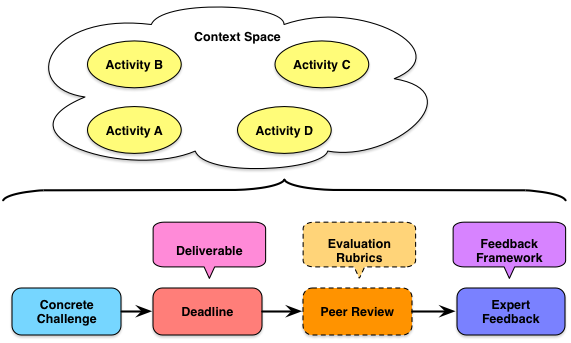I’m working on the learning science workshop I’m going to present at DevLearn next month, and in thinking about how to represent the implications of designing to account for how we work better when the learning context is concrete and sufficient contexts are used, I came up with this, which I wanted to share.
 The empirical data is that we learn better when our learning practice is contextualized. And if we want transfer, we should have practice in a spread of contexts that will facilitate abstraction and application to all appropriate settings, not just the ones seen in the learning experience. If the space between our learning applications is too narrow, so too will our transfer be. So our activities need to be spread about in a variety of contexts (and we should be having sufficient practice).
The empirical data is that we learn better when our learning practice is contextualized. And if we want transfer, we should have practice in a spread of contexts that will facilitate abstraction and application to all appropriate settings, not just the ones seen in the learning experience. If the space between our learning applications is too narrow, so too will our transfer be. So our activities need to be spread about in a variety of contexts (and we should be having sufficient practice).
Then, for each activity, we should have a concrete outcome we’re looking for. Ideally, the learner is given a concrete deliverable as an outcome that they must produce (that mimics the type of outcome we’re expecting them to be able to create as an outcome of the learning, whether decision, work product, or..). Ideally we’re in a social situation and they’re working as a team (or not) and the work can be circulated for peer review. Regardless, then there should be expert oversight on feedback.
With a focus on sufficient and meaningful practice, we’re more likely to design learning that will actually have an impact. The goal is to have practice that is aligned with how our learning works (my current theme: aligning with how we think, work, and learn). Make sense?
Hello Clark,
I noted your comment “With a focus on sufficient and meaningful practice, we’re more likely to design learning that will actually have an impact.” I have just returned from Nairobi where I led a workshop on transformational learning in which the participants had to design a learning response to a particular situation in their country. One group decided to create training for care-givers to help those traumatized by Boko Haram in northern Nigeria. Our approach is that there have to be community impacts in the outcomes of the training as well as demonstrable development of competence in the learners. I was glad for your comment because there are few who think of outcomes in the context as well as for the learner. I would love to dialogue more with you on this when you have time.
I tend to take it for granted that better outcomes are achieved where learning is contextual. You mentioned empirical research on this. Can you point me to some sources?
Many thanks,
Richard
Richard, I love service learning as a model; where you do projects that help the community. As to research, my starting point would be Bransford, et al’s work on Anchored Cognition, and Brown & Collins’ Situated Learning. You can look at Jean Lave’s work with mathematics in Brazilian street kids, and the overall Situated Cognition work (beyond learning) such as Andy Clark’s Being There book.
This is great! I feel as though this is what I’ve been trying to do in my teaching, but hadn’t been able to articulate the framework clearly. Thank you.